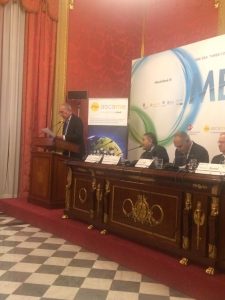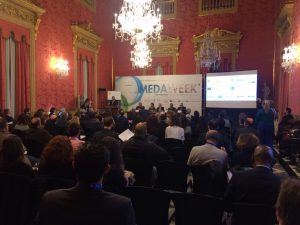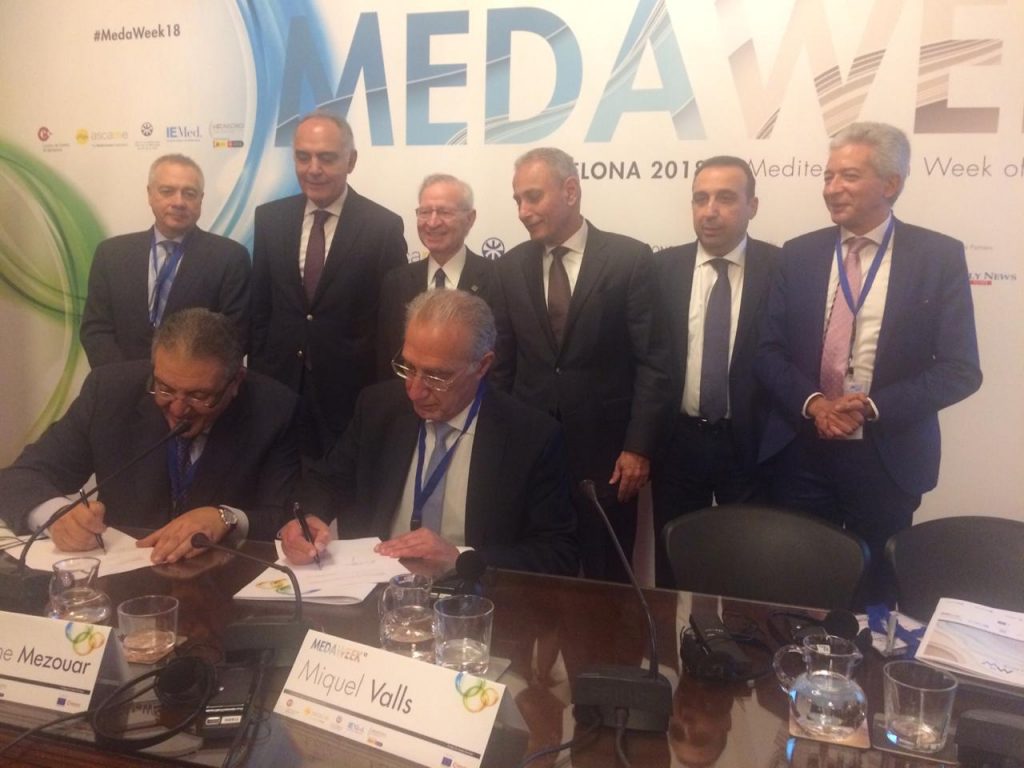São Paulo – This Wednesday (21), the Arab Brazilian Chamber of Commerce signed a memorandum of understanding with the Association of Mediterranean Chambers of Commerce and Industry (ASCAME). The Arab Chamber’s president, Rubens Hannun (right, in the picture above), and ASCAME’s president, Egyptian Ahmed El Wakil (left, in the picture above), signed the agreement in the first day of the 12th Mediterranean Week of Economic Leaders (MedaWeek), in Barcelona, Spain.

The Arab Chamber is taking part in the event that gathers the region’s chambers of commerce as a guest. The Arab Chamber’s executive of International Business, Fernanda Baltazar, joined Hannun in the event. After signing the agreement, ASCAME and the Arab Chamber will exchange information, organized joint actions to bring closer the two regions’ commercial sectors and support each other mutually. “This opens up a new relationship for our member companies,” said Hannun to ANBA, from Barcelona.
ASCAME includes chambers of commerce from Arab countries such as Algeria, Egypt, Jordan, Lebanon, Libya, Morocco, Tunisia and Syria, plus other nations such as Spain, France, Italy and Greece, all of them bordering the Mediterranean Sea. The Arab Chamber’s president believes that, in addition to strengthen the organization’s relationship with these Arab countries, the partnership can open up doors in Europe. Baltazar even foresees the possibility of Brazilian companies exploring Europe’s halal market, with its Muslim consumers, via the Arabs in the Mediterranean.
The Arab Chamber’s president spoke in the opening event of MedaWeek, which theme is “One Sea, Three Continents: Sharing Common Goals”, subdivided in the categories North Africa, Innovation and Halal. Rubens Hannun spoke on the goals shared with ASCAME, since the issues chosen to be discussed by the organization in the event are of interest to the Arab Chamber and are continuously being addressed by it.
Hannun said the Mediterranean countries are among the top 10 in volume of investments in Brazil. “This shows that there is potential to be tapped, to do a joint collaboration,” said Hannun. He also showed the size of Brazil’s halal market, in which the country is the main protein exporters. Halal products are produced according to the Muslim norms. Baltazar believes that this is one of the sectors that can be explored with the Arab countries in the Mediterranean.

Hannun invited those in attendance of MedaWeek to the 2nd Brazil-Arab countries Economic Forum, to be held in 2020, in Brazil. The first edition, organized by the Arab Chamber, took place in São Paulo in April 2018 and gathered 800 people, particularly Brazilian and Arab entrepreneurs, and was attended by President Michel Temer. The event discussed many issues, among them innovation and halal, two of the subjects to be addressed by the Barcelona event. The invitation was met with great interest, according to Hannun.
MedaWeek began this Wednesday and runs until Friday (23). The Arab Chamber will follow and take part in the discussions. The event’s website states that the Mediterranean is going through significant social, political and economic changes, and that they represent an opportunity for the countries to reinforce and improve their cross-border cooperation. The Barcelona event falls within this cooperation mindset.
The event gathers entrepreneurs and representatives of the private sector, business support organizations such as chambers of commerce, promotion agencies, political authorities and the international media. It is organized by ASCAME, the Barcelona Chamber of Commerce, the Union for the Mediterranean and the Barcelona Free Trade Zone Consortium, with the organization of other companies. According to Hannun, the importance of the Brazilian industry and its integration with the Mediterranean was highlighted by the attendees in the opening day.
Translated by Sérgio Kakitani




